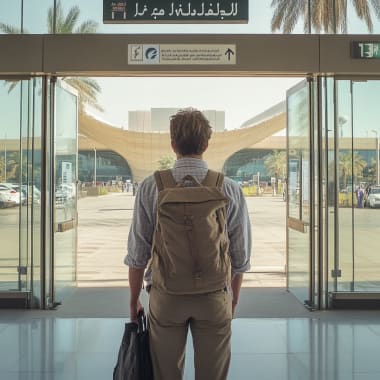
Vaccinations and health precautions for Saudi Arabia
An overview of all vaccination recommendations and preventive measures
An overview of all vaccination recommendations and preventive measures
Saudi Arabia fascinates with a unique mix of modern metropolis and millennia-old culture, impressive desert landscapes, sacred sites, and fascinating architecture. However, those who want to explore this extraordinary travel destination individually should familiarize themselves not only with cultural peculiarities and climatic conditions but also with health precautions that play a central role in ensuring a safe and relaxed trip.
From mandatory vaccinations to sensible preventive measures against tropical diseases: This article explains what medical preparations are important for a trip to Saudi Arabia, what to pay attention to when planning, and how to effectively protect yourself from health risks. This way, you will be well prepared for a completely safe travel experience in the kingdom.
- Healthy in Saudi Arabia: The most important medical travel information
- Mandatory and recommended vaccinations
- Protection against mosquito-borne diseases
- Precautionary measures and travel medical services
- Travel planning: Timing and activity planning
- Collaboration with health service providers
- General health precautions and hygiene tips
Healthy in Saudi Arabia: The most important medical travel information
Saudi Arabia is increasingly opening up to independent travelers who want to discover the country off classic tourist paths – whether while exploring modern cities, hiking through rugged mountain landscapes, or on a road trip through the expanses of the desert. However, those traveling independently in the kingdom should not only prepare for climatic and cultural peculiarities but also be in good health.
Why are vaccinations and health precautions important?
Vaccinations and preventive measures are among the most important foundations of a safe trip. They protect against diseases that are more common in the travel destination than in Europe and help avoid potential health incidents from the outset. Especially in hot climates with regionally occurring infectious diseases – such as mosquito-borne fever diseases or water and food-borne infections – effective protection is particularly important. Targeted preparation not only reduces health risks but also ensures a carefree travel experience.
The travel medical requirements for Saudi Arabia
Although Saudi Arabia does not impose a general vaccination requirement for tourists, certain medical requirements should be taken into account before traveling. Since 2025, vaccination against meningococci (ACYW135) is mandatory for entry, regardless of the purpose of travel. The international vaccination certificate must be carried. Additionally, the Foreign Office, WHO, and the Saudi Ministry of Health recommend checking personal vaccination status – especially against measles, diphtheria, tetanus, polio, and pertussis.
Additionally, vaccination against hepatitis A may be advisable, and for longer stays, also against hepatitis B or rabies. For independent travelers visiting regions with increased dengue risk, additional consultation with a tropical medicine specialist can be helpful. Anyone with pre-existing health conditions should seek medical advice in advance. With the right preparation, there is nothing standing in the way of a safe and enriching trip through Saudi Arabia.
Mandatory and recommended vaccinations
Following the basic medical requirements, a closer look at the specific vaccination recommendations and requirements for independent travelers to Saudi Arabia is worthwhile. While some vaccinations are mandatory for entry, others provide additional protection and should be considered depending on the travel itinerary, duration of stay, and individual risks.
Mandatory vaccinations for entry
As previously mentioned, since February 2025, vaccination against meningococci of the ACWY serogroup is mandatory for all travelers aged one and older – even for tourism stays. The vaccination certificate must be presented upon entry and should therefore be carried both digitally and in paper form.
In addition, further regulations apply only to specific groups of people: Anyone who has recently been in a yellow fever endemic area or who has made a longer stop there must have a valid yellow fever vaccination. For travelers from countries with current polio occurrences, proof of vaccination is also required. These regulations usually do not affect travelers from Germany but should be considered for more complex travel routes.
Additional recommended vaccinations
In addition to the mandatory vaccinations, the Foreign Office and international health organizations recommend a number of protective vaccinations that should be tailored to individual needs. Hepatitis A is considered the most important travel vaccination for all tourists, as the virus can be easily transmitted through contaminated food or drinking water.
For longer stays, close contact with the local population, or planned medical procedures, a hepatitis B vaccination is additionally advisable. Those who travel actively, are in rural areas, or may come into contact with animals should consider getting a rabies vaccination. Protection against dengue fever – either through vaccination or at least thorough consultation – can also be recommended, especially for stays in areas known for mosquito populations, such as the west coast around Jeddah.
A complete routine vaccination schedule in accordance with the German vaccination calendar is also essential, including vaccinations against measles, diphtheria, tetanus, pertussis, and poliomyelitis. And even though no current COVID-19 vaccination proof is required for entry, it is still advisable – especially for people with pre-existing conditions or when traveling with increased contact potential.
Protection against mosquito-borne diseases
In addition to vaccinations, protecting against mosquito bites is one of the most important measures for health while traveling to Saudi Arabia. Although the risk of malaria is low nationwide, infections with dengue or chikungunya occur regularly in certain regions. Therefore, those traveling through cities or remote areas should know where extra caution is required and how to protect themselves effectively.
Risk assessment for dengue and malaria
An increased risk of dengue fever exists primarily in urban areas like Jeddah, Mecca, and Medina. The disease is transmitted by daytime-active Aedes mosquitoes and regularly occurs there, especially in warmer months. Although the disease is usually mild in most cases, complications are possible – especially for children or individuals with pre-existing conditions.
Malaria, on the other hand, is only a concern in limited regions of Saudi Arabia: affected are rural areas in the southwestern provinces of Asir and Jizan, as well as the border area with Yemen. Cities like Riyadh, Jeddah, or Taif are considered malaria-free. Even though the affected regions usually only have isolated, imported cases, travel medical advice is recommended – especially for longer stays or travel to remote areas.
Effective precautions against mosquito bites
The most effective protection against mosquito-borne diseases is the combination of several simple measures that can easily be integrated into daily travel life:
- Repellents containing DEET are considered the gold standard: A protection level of 30 to 50% DEET can reliably protect against bites for several hours depending on the concentration. Icaridin is also a good alternative, especially in dengue-prone regions without malaria risk.
- Long, light-colored clothing significantly reduces the likelihood of bites – ideally loose-fitting and possibly treated with insect repellents like permethrin.
- Mosquito nets, especially if treated, offer additional protection at night – especially important in rural accommodations.
- Indoors, air conditioning, fans, and mosquito sprays reduce mosquito activity. Windows and doors should remain closed whenever possible, especially at dusk.
- Avoid staying near standing water, such as open water tanks or unkempt gardens – they are preferred breeding sites for mosquitoes.
For travel to regions with malaria risk, it may also be advisable to carry emergency medication (standby therapy) – consult your doctor for individual advice. The newly available dengue vaccine (Qdenga) could also be considered in individual cases but should always be coordinated medically.
Precautionary measures and travel medical services
In addition to vaccinations and mosquito protection, other preventive measures and knowledge of medical care options are crucial for a safe trip to Saudi Arabia. Particularly independent travelers who venture off the beaten tourist path benefit from carefully thought-out health precautions.
Medications and exposure prophylaxis
For most regions in Saudi Arabia, malaria prophylaxis is not necessary, as the risk is limited to a few rural areas in the southwest (e.g. Asir, Jizan). However, those traveling to these regions can discuss so-called standby medication with their doctor. In any case, consistent mosquito protection through repellents, suitable clothing, and possibly mosquito nets is indispensable, even without medication prophylaxis.
Diarrheal diseases are among the most common travel problems worldwide – including in Saudi Arabia. Therefore, strict food and drinking water hygiene is especially important: drink only bottled or boiled water, avoid unpeeled fruit, raw vegetables, and unpasteurized dairy products. A well-stocked travel pharmacy with electrolyte preparations (e.g. oral rehydration solutions) should always be on hand. Medication prophylaxis for diarrhea is generally not necessary but could be useful for at-risk groups – this can also be clarified individually within the framework of travel medical counseling.
In addition, some general hygiene rules apply: handwashing, disinfection on the go, and avoiding contact with sick individuals or camels (due to the risk of MERS-CoV) help further reduce the risk of disease.
Available travel medical services
Medical care in Saudi Arabia is generally good in large cities like Riyadh, Jeddah, or Mecca and meets international standards. Private clinics and English-speaking specialists are widely available and also accessible to foreign travelers. Outside the metropolises, however, quality may vary, and state hospitals are usually only open to foreigners for emergency care.
For travel preparation, numerous travel medical counseling centers are available in Germany – including tropical institutes, specialized general practitioners, or certified contact points from the German Society for Tropical Medicine (DTG). Here, vaccinations can be administered, personal health risks can be analyzed, and recommendations for travel pharmacies or emergency medications can be provided.
Important: For Saudi Arabia, it is advisable to take out comprehensive health insurance that also covers repatriation and treatment in private clinics. Bringing your own medications is also allowed – for a period of up to 90 days. A medical confirmation in English can be helpful, especially for prescription medications.
Travel planning: Timing and activity planning
Health preparation for a trip to Saudi Arabia depends not only on the travel destination but also on the timing of the trip and the planned activities. Heat, regional infection risks, and environmental conditions can vary significantly depending on the season and type of travel – tailored planning is therefore crucial.
Impact of travel time or season
The season has a significant impact on health requirements. In summer, temperatures over 40°C are not unusual – especially for stays in the interior or in the desert. For independent travelers, this means: heat protection is of utmost priority. Sufficient hydration, light and covering clothing, sunscreen, and regular breaks in the shade are essential to avoid heat stroke and circulatory problems.
Those traveling in the winter months benefit from more pleasant temperatures – the physical strain from heat is less, and the overall health risk decreases. Nevertheless, regardless of the season, hygiene measures, vaccination protection, and mosquito protection should never be neglected.
Even though pilgrimage trips like Hajj and Umrah do not belong to the target group, it is important to know: During these peak times, the medical infrastructure is under higher strain, and stricter health checks may occur at airports and in large cities.
Particular health measures for certain activities
The nature of your trip largely determines which health precautions may additionally be advisable. Desert trips, for example, are scenically attractive but present particular challenges: in addition to extreme heat and high UV radiation, sand and dust storms can occur that are particularly burdensome for individuals with respiratory diseases. Appropriate respiratory protection, such as through cloths or masks, is sensible in such cases.
In certain remote areas – particularly in the southwest near the Yemeni border – there is also a low risk of malaria and the occurrence of other diseases transmitted by mosquitoes or ticks, such as dengue, leishmaniasis, or chikungunya. Consistent mosquito protection is essential here.
Anyone traveling near oases should avoid contact with freshwater, as there is a risk of schistosomiasis (bilharzia). In urban stays, hygiene conditions and air quality are of greater importance: air pollution can strain the respiratory tract, and unpasteurized dairy products should be avoided to prevent brucellosis infections.
For all activities: the more intense the contact with nature or the local population, the more important it is to seek early travel medical advice to align vaccinations or protective measures individually.
Collaboration with health service providers
Even the best medical preparation begins with a well-founded consultation talk. Those who seek contact with travel medical specialists early lay the groundwork for a customized health strategy – tailored to the travel destination, season, and personal circumstances. For independent travelers to Saudi Arabia, such advice is particularly recommended, as requirements and risks can vary significantly depending on region and activity profile.
Effective communication with health service providers
To allow physicians to provide well-founded recommendations, you should prepare well for the consultation appointment. It is particularly helpful if you have the following information ready:
- Travel itinerary and exact routes – including stopovers, regions with special climate or health risks
- Planned activities and accommodations – such as desert tours, urban stays, or travel to rural areas
- Timing of travel – to assess seasonal risks (e.g. heat in summer or mosquito season)
- Age, general health status, chronic illnesses, or pregnancy
- Vaccination record, a list of regularly taken medications, and known allergies
This information enables the health service provider to make targeted recommendations and recognize any contraindications early on. Ideally, the consultation should take place six to eight weeks before travel to ensure that vaccinations can be completed on time and tolerated well.
Personalized travel medical recommendations
Based on the information you provide, the specialist will create a tailored vaccination and prevention plan: Mandatory vaccinations (e.g. against meningococci ACWY) will be considered as well as recommended additional vaccinations – such as against hepatitis A or B, rabies, or dengue – depending on your individual risk profile.
Moreover, you will receive information about other protective measures, such as assembling a personal travel pharmacy, managing heat, or mosquito control. For trips with particular exposure or longer duration of stay, occupational medical advice may also be beneficial.
It is also important to look beyond the horizon: Travel medical practices can assist you in using reliable sources and preparing for sudden changes – such as in infection dynamics or entry regulations. This way, you ensure a healthy, relaxed trip – medically accompanied and tailored to your needs.
General health precautions and hygiene tips
A conscious approach to hygiene and environmental factors is one of the simplest yet most effective ways to avoid health problems while traveling. This is particularly true for Saudi Arabia: high temperatures, unfamiliar climatic conditions, and regional infection risks make targeted precautions essential – especially when traveling off the beaten tourist paths.
Hygiene tips for a healthy stay
Many of the most common travel illnesses can be avoided by simple hygiene rules. First and foremost is thorough hand hygiene: Wash your hands regularly with water and soap – especially before eating, after using the restroom, and after contact with many people. If necessary, an alcohol-based disinfectant can serve as a supplement.
When it comes to drinking water, caution is advised: Use only bottled water – not just for drinking but also for brushing teeth or rinsing dishes. Tap water is considered unsafe and should be avoided. For food, the rule of thumb applies:Boil it, cook it, peel it or forget it– that is, cook, fry, peel, or better yet, completely avoid. Avoid raw meat, unpeeled fruit, undercooked foods, or street food that is not served fresh and hot.
Contact with animals, especially camels, should also be avoided – as well as the consumption of unpasteurized dairy products to prevent infections such as MERS or brucellosis. In crowded places, wearing a mask is recommended to prevent respiratory infections. Always carry a small travel pharmacy with you – ideally supplemented by medical documents and the vaccination record.
Acclimatization to climate and environment
Saudi Arabia is known for its hot, dry climate – particularly in the summer months when temperatures can rise significantly above 40°C. Those who are not well prepared risk quickly suffering from heat damage or circulatory problems. The most important protection: regular hydration – even without feeling thirsty. Avoid sugary or caffeinated beverages, as they can additionally dehydrate the body.
Plan activities preferably in the early morning or late evening hours, and avoid physical exertion in the midday heat. Wear light, loose clothing, use sunscreen with a high sun protection factor, and cover your head with a hat or scarf. Those who spend time outdoors should always have access to air-conditioned spaces to cool down regularly.
Sand and dust storms are also not uncommon in Saudi Arabia. In such cases, it is advisable to keep windows and doors closed and to use respiratory masks or cloths to protect the airways – especially important for people with chronic lung or cardiovascular diseases.
Particular attention should be paid to children, the elderly, and those with chronic illnesses: They react more sensitively to heat and dryness and therefore require additional caution and retreat options. Gradual acclimatization in the first days of travel can help ease the body's adjustment.
Discover the Orient with experts who have explored every corner themselves
Your dream holiday, tailor-made by experts.
We don't just know the Middle East from books, we visit the country several times a year to experience the culture, landscape and people first-hand.
From your first enquiry to your return home, we are there for you personally - by phone, email or WhatsApp, whenever you need us. Our trips are as unique as you are: individually planned and provided with exclusive privileges and high-quality arrangements that will make your trip unforgettable.
Experts for your Orient trip







